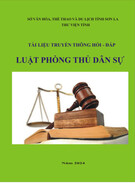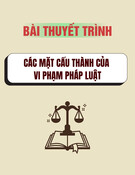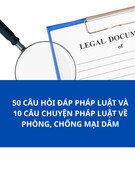
Journal of Development and Integration, No. 78 (2024)
92
K E Y W O R D S A B S T R A C T
Completion,
Economic development,
Meeting requirements,
Property registration,
Solutions.
The design of asset registration has significant importance in publicly disclosing and
transparently informing about the legal status of assets, closely linked to the civil rights
of individuals and organizations when establishing and exercising ownership rights and
other rights related to assets. A truly market-oriented economy cannot function without
the existence and operation of a transparent and modern asset registration system.
Therefore, in recent years, Vietnam has made efforts to establish legislation on property
registration, which serves as a crucial legal foundation for recognizing and protecting
ownership rights and other rights related to the assets of organizations and individuals.
This helps enhance the government’s ability to manage information on the current status
and legal condition of assets. The article analyzes the economic impacts of improving
the legislation on property registration in Vietnam to meet the requirements of economic
development in the context of integration.
Completing the legal framework for asset registration in Vietnam
to meet the demands of economic development
Pham Huynh Bao Oanh1, Vu Anh Sao1,2, *
1Ho Chi Minh City University of Economics and Finance, Vietnam
2University of Economics and Law, Viet Nam National University Ho Chi Minh City, Vietnam
* Corresponding author. Email: saova@uef.edu.vn
https://doi.org/10.61602/jdi.2024.78.12
Received: 26-Mar-24; Revised: 26-Jul-24; Accepted: 05-Aug-24; Online: 24-Aug-24
ISSN (print): 1859-428X, ISSN (online): 2815-6234
1. Definition of property registration
The concept of “registration” is expressed in the
dictionaries that explain the word, specifically as:
“Registration: Record in the ledger of the governing
body” (Vietnam Encyclopedia); “Registration:
Format Recording in state books such as: marriage
registration, business registration, securities
registration… The events recorded in the book cannot
be denied argue” (Vietnamese Great Dictionary).
Other ways to understand registration is to record in
the system of books and records of the “registering
entity” information about the “registering subject”
and “registered object” to ensure the fulfillment of
obligations, responsibilities, or ensure the rights and
interests of the registrant and entities related to the
registrant. There is a view that property registration
is the official recording in a document by a competent
state agency of the necessary information of the
incident, which is the basis for creating, changing,
or terminating legal obligations of property relations
between subject. Therefore, registration is a form
of recognition of one person’s rights or giving rise
to obligations towards another person. Registration
is a form to protect the subject performing the act
of registration and force the obligor to perform his
No. 78 (2024) 92-98 I jdi.uef.edu.vn

93
Journal of Development and Integration, No. 78 (2024)
or her obligations. The information recorded in the
registry’s book by the competent authority is objective
evidence that cannot be disputed.
Currently, there are no specific legal regulations
on the definition of property registration but there
are only regulations on registration of specific
types of assets. In the Vietnamese Law on Land, it
is stated “Registration of land, houses and other
land-attached assets means the declaration and
acknowledgement of the legal status of land use
rights, ownership of houses and land-attached assets,
and the right to manage a certain land parcel, in the
cadastral records” according to Clause 15, Article
13, Vietnamese Law on Land 2013. In the Circular of
the Ministry of Natural Resources and Environment,
it is determined that “Land registration, property
attached to land for the first time (the latter known as
the first registry) was the first implementation of the
procedure for the recognition of the legal status of
land use, housing ownership, other property attached
to the land and soil management rights to a parcel
of land into the main site” according to Clause 2, 3
Article 3, Circular 24/2014/TT-BTNMT. Through the
above concept of land registration, land registration
is intended to record the legal status of the property (a
plot of land) in the cadastral records and be recognized
as having land use rights recorded on the certificate or
recorded in the registered book in case of registering
housing ownership. However, certificates of land use
rights, ownership of houses and other assets attached
to land are only legal documents for the State to
confirm the rights of land users and owners of assets
on land. It is not clear whether the purpose of the
above registration is to establish the rights of land
users, property owners, or is the registration valid
against third parties. The registration of assets such
as land use rights and house ownership rights are
understood as registration giving rise to the validity
of the transaction and the consequences of arising
validity are carried out according to Article 401 of
the Civil Code 2015.
The definitions demonstrate that when an object
is registered, the legal rights and interests of the
subject are safeguarded if the subject adheres to the
legal requirements. Conversely, if an object is legally
mandated to be registered but the legal subject fails
to comply, the rights and obligations of the subject
in relation to the established relationship will not
be acknowledged or protected by law. In numerous
interactions, the individual breaches the duty to
officially record items that are legally mandated to be
recorded, therefore non-compliance with registration
is deemed an unlawful action.
In terms of form, property registration is a process
and method designed to safeguard the lawful rights
and interests of property owners in the ownership,
use, transfer and utilize assets to engage in civil
relations, commerce, technology transfer, as well as
import and export activities.
In terms of content, property registration involves
publicly announcing the rights of the property
owner, serving as evidence for legal action in case
of property violation. This includes requesting the
stopping of infringing activities, reclaiming the
property, claiming compensation for damages, and
stopping acts of infringement or unfair competition
related to intellectual property rights. These rights
pertain to various products such as inventions,
industrial designs, designs of semi-conducting
closed circuits, trade secrets, marks, trade names,
geographical indications and copyrights, other rights
related to performances, audio and visual fixation,
and broadcasts and satellite signals carrying coded
programmes.
From the perspective of human rights in society,
property registration is a valuable mechanism for
individuals and organizations to exercise and enhance
their property rights in society. This demonstrates
that in a contemporary society, the establishment
of property registration must be seen as both a civil
right and a personal right (a right of the citizen) to
solidify the recognition and protection of the right
to private property as stated in the Constitution.
To ensure the effective exercise of civil rights, the
legislation regarding registration should establish
advantageous circumstances for individuals and
enterprises, focusing not only on administrative
acts but also on the practical implementation of
administrative procedures. This demonstrates that
when regarding registration as a fundamental civil
entitlement, the legal framework must exhibit a high
degree of adaptability. Any regulations that impede
the exercise of these rights should be eliminated and
replaced with regulations that promote and facilitate
individuals and businesses in the exercise of their
rights.
From the above analysis, it can be defined as
follows: Property registration can be defined as the
process in which a competent state agency officially
records legal events that establish, change, limit, or
Pham Huynh Bao Oanh et al.

Journal of Development and Integration, No. 78 (2024)
94
terminate property rights of both organizations and
individuals. These records are documented in the
property register book, following the specific order
and procedures mandated by law.
2. Benefits of property registration
Registration activities aim to effectively allocate
and use resources, contributing to macroeconomic
stability and sustainable growth.
2.1. Benefits for the state
First, property registration assists the government
in seizing the nation’s assets. Currently, there are a
great deal of assets in society, including assets over
which the state has information or administration,
particularly land assets. Due to the constant circulation
of movable assets in the economy, it is difficult for
the state to capture information about this category
of asset. Individual property registration will aid
state agencies in understanding the quantity of assets
in society, thereby facilitating the development of
effective asset utilization plans and orientations.
Second, property registration is a state-provided
public service. Property registrants are required to
pay state fees. Consequently, property registration is
also an activity that contributes to the state budget.
2.2. Benefits for the citizen
Property registration provides important benefits
to individuals, particularly in civil transactions,
namely:
Firstly, individuals have convenient and
straightforward means of obtaining legal information
pertaining to the property. Property registration,
which encompasses both moveable and real estate,
ensures that the legal status of the property, including
ownership and usage rights, is publicly accessible
and clear. By having unrestricted access to the
registration registers of state agencies, the public
may effortlessly get precise information on the legal
standing of assets, such as details about the owner.
The document should include details on ownership,
including the specific characteristics and present
state of the property. Additionally, it should provide
information about any limits on the owner’s rights
to the property, such as mortgages or pledges. There
is enough evidence to determine whether one can
engage in civil and commercial transactions involving
property. Furthermore, the time of registration serves
as the criterion for establishing the hierarchy of rights
among parties involved in multiple transactions
with assets. Intellectual property rights registration
has significant importance in the State’s efforts to
create and safeguard intellectual property rights for
registered objects, in addition to its more commonly
recognized qualities.
Secondly, foster the growth of the real estate
market, capital market, commodities market, and
science and technology market in a manner that is
both beneficial and sustainable. The registration
of real estate is closely interconnected with the
functioning of the real estate market, capital market,
commodities market, and science and technology
market in our nation. Many economic analysts assert
that in developed nations, efficient management
and promotion of the property registration system
may stimulate the growth of the sectors, so directly
impacting the economy. The economy’s advancement
has made significant and practical contributions to
the country’s industrialization and modernization.
Conversely, research indicates that the primary
and prevalent objective of property registration is
to serve as an efficient mechanism for ascertaining
the economic worth of assets and generating legal
documentation for each asset category. This, in turn,
facilitates secure and risk-mitigated transactions.
Thirdly, increase the capability of maximizing the
economic value of assets. Asset registration activities
facilitate the exploitation of economic value (including
intangible assets). This function is particularly useful
since small and medium-sized businesses make up
a significant element of the economy in our nation
but have few requirements to own and utilize real
estate, resulting in difficulties when accessing bank
capital. Due to a lack of transparency and inadequate
mechanisms, the purchase, sale, and transfer of
debt collection rights, commodities circulating in
the production and business process, apparatus, and
equipment, etc. in our country are not particularly
vibrant and effective. Uncertain and ineffectual is
the legal status used to ascertain the legal status of
movable property. The results of a survey indicate
that movable assets and intangible assets are the
most valuable sources of an enterprise’s business
capital (typically accounting for 70 to 80 percent of
enterprise value), but it remains challenging to convert
these assets into investment capital for production
Pham Huynh Bao Oanh et al.

95
Journal of Development and Integration, No. 78 (2024)
and business activities. The State lacks the means to
publicize the legal rights and interests of proprietors of
movable property, so investors and credit institutions
lack confidence when contemplating and deciding
on joint investments relating to the enterprise’s real
estate holdings.
3. The economic impact of improving legislation on
property registration
There is always a reciprocal impact between
economics and law, therefore, economics plays a
decisive role in determining the content and form of
the law. However, the law also has a reverse impact
on economics, either promoting or restraining its
development. As a result, the registration of assets
is closely related to economic development and
business environment. However, the current situation
in Vietnam regarding the completion of regulations
on property registration still has many shortcomings.
The legal environment for protecting business assets
in Vietnam is not yet high compared to other countries
in Asia and the world. Research also indicates that
ensuring property rights in the production and
business activities of enterprises aims to secure the
ability to use real estate in the business operations,
such as expanding or contracting the production/
business capacity of the enterprise, or increasing the
production area, accessing credit capital, developing
agricultural production, and enhancing innovation
and creativity in production and business activities.
The administrative management quality of land in
Vietnam is much worse compared to many countries,
even when compared to countries with similar income
or higher per capita income.
One reality in property registration, especially for
real estate in Vietnam, is the difficulty in administrative
procedures. This results in prolonged processing
times, instances of misconduct and violations by
Officials in carrying out their duties, and instances
of corruption in the handling of documents and
paperwork related to land.
During the implementation of economic
development policies, industrial parks play a crucial
role in promoting Vietnam’s industrialization,
modernization, and ensuring sustainable development.
However, the cost of land rental in industrial zones
does not provide favorable conditions for businesses,
especially small and medium-sized enterprises, due
to high rental prices, large rental areas, and the lack
of collateral for land rental contracts, making it
difficult for businesses to borrow capital from banks
despite their investments in the land. Furthermore,
it should be noted that the kind of tourist villas and
tourist apartments (condotels) specified in Article
48 of the Law on Tourism 2017 are not considered
residential properties as defined in Article 3 of the
Law on Housing 2014. At present, there are no
existing legislative provisions for the issuance
of ownership certificates for individual units of
tourist villas or flats. This practice has hindered the
development of the luxury villa and tourist apartment
market. Similarly, in the case of long-term leasing
agreements for apartments and offices, they are not
registered with the relevant government agency,
which fails to protect the rights of tenants and thus
hinders the market for such properties.
Another drawback is that, according to a survey
conducted by the World Bank, limited access to
finance is the biggest hindrance to business operations.
Financial institutions in Vietnam need more collateral
for loans compared to certain countries in the region.
However, obtaining credit from a bank or financial
institution often requires collateral. Assets that are
eligible for collateral must be issued with certificates,
such as land use rights certificates, home ownership
rights certificates, and other assets attached to land, as
well as other relevant ownership certificates (such as
motor vehicle registration certificates, ship registration
certificates, and aircraft registration certificates). The
empirical evidence demonstrates that the proportion of
private sector enterprises accessing credit from banks
in the region is progressively declining compared to
other components of the economy.
This decline can be attributed to several factors,
such as the increasing number of newly established
businesses, businesses lacking assets to meet the
lending requirements of financial institutions,
cumbersome loan procedures at banks, and businesses
having to pay unofficial fees to bank officials to access
credit sources.
Furthermore, private enterprises (mostly small
and medium-sized businesses) have limited access
to capital sources from the capital market (such as
stocks and bonds) to support their business operations.
Instead, they primarily rely on credit from banks or
informal financial systems (such as borrowing from
family, friends, associations, clans, neighborhoods, or
engaging in black market credit). This practice poses
a significant challenge for citizens and businesses
Pham Huynh Bao Oanh et al.

Journal of Development and Integration, No. 78 (2024)
96
engaged in production and commercial activities.
According to a comprehensive review, Vietnam
has around 12 sectors for property registration. Each
field has its own system of agencies responsible
for registering private assets. Currently, there are a
considerable number of agencies responsible for
property registration, although there are no official
statistics on this quantity. Typically, asset registration
only applies to mandatory asset groups. These issues
result in the following economic impacts:
- Economic growth.
- Accessibility to credit for individuals and
businesses.
- Credit development.
- Development of an innovative economy.
- Ensuring contract enforcement; and
- Budget and social costs for each option.
Despite having similar or higher income levels,
Vietnam’s administrative management quality of land
is far worse than many other countries. According to a
survey conducted by the World Bank, administrative
land management quality in countries encompasses
issues related to administrative procedures and
transparency in land management.
These issues may also stem from the current
operational activities of registration agencies.
Therefore, the current model of asset registration
authorities must be researched and improved to
align with the requirements of asset registration in
economic development.
Based on the findings of the examination of legal
requirements pertaining to the registration of rights
and property transactions, the lack of transparency in
asset information, whether it pertains to real estate or
moveable property, will facilitate market growth. Lack
of formality in property ownership. Currently, many
assets lack registration or are registered only after
they have been transferred, resulting in the emergence
of an informal market. Data pertaining to real estate
is being disseminated across many institutions,
including the land database administered by the
Ministry of Natural Resources and Environment,
the housing database, and the real estate market.
The Ministry of Construction is accountable for the
construction, storage, and administration of national
assets, whereas the Ministry of Agriculture and Rural
Development manages the database for forestry land
in special-use forests.
Regarding various properties, the registration
of sea vessels is managed by the Maritime
Administration of Vietnam under the Ministry of
Transport. The registration of aircraft in Vietnam
is overseen by the Civil Aviation Authority of Viet
Nam also under the Ministry of Transport. The
registration of road vehicles is carried out by the
Traffic Police Department of the Ministry of Public
Security, which also handles the issuance of vehicle
registration certificates and license plates. The
registration of inland waterway vehicles is managed
by the Inland Waterways Administration of Vietnam,
under the Ministry of Transport. The registration of
national artifacts, antiques, and treasures is under the
jurisdiction of the Departments of Culture, Sports,
and Tourism.
The dispersion of information management will
also result in a lack of coherence in information
management methods and a lack of information
integration. Investors and government agencies have
challenges in regulating both formal and informal
financial asset markets.
4. Conclusions and recommendations for improving
the legislation on property registration in Vietnam
The research and review of asset registration
regulations indicate that the legal provisions in
Vietnam are rather comprehensive. The effort
required to register various types of assets (such
as land, intellectual property rights) is rather high.
However, Vietnam still lags many other countries in
the Asian region as well as countries with similar low
average incomes. Based on the analysis of the impacts
of improving the law on property registration on the
economy and business environment, the following
recommendations are proposed:
Firstly, the improvement of legal regulations
on the registration of rights and transactions of
assets in Vietnam has a significant impact on the
economy, society, and law. Based on the analysis of
the aforementioned aspects, in the current stage of
Vietnam, the option of issuing a unified regulation
on the registration of rights and transactions related
to real estate, while maintaining regulations on the
registration of movable property in specialized
laws, is a suitable and feasible solution to promote
economic growth, develop an innovative society,
transform the economic sector structure, reduce
reliance on traditional resource-based growth, and
mitigate social instability caused by disputes over
land use rights. In the future, there will be plans to
Pham Huynh Bao Oanh et al.








![Sổ tay Hỏi đáp Tình huống pháp luật: Giải đáp chi tiết và [Thêm từ khóa liên quan]](https://cdn.tailieu.vn/images/document/thumbnail/2025/20251010/kimphuong1001/135x160/4211760064216.jpg)


![Tài liệu ôn tập Pháp luật đại cương [chuẩn nhất/mới nhất]](https://cdn.tailieu.vn/images/document/thumbnail/2025/20251124/anh864075@gmail.com/135x160/79961763966850.jpg)














